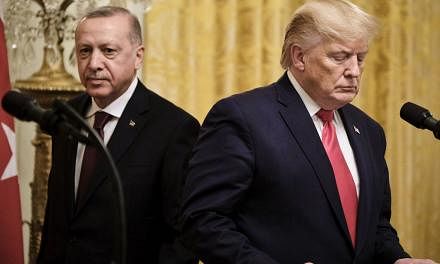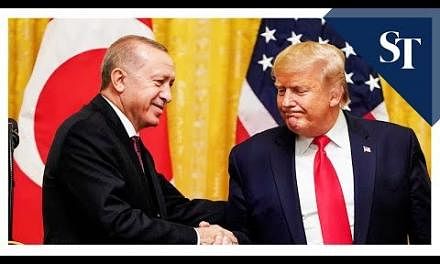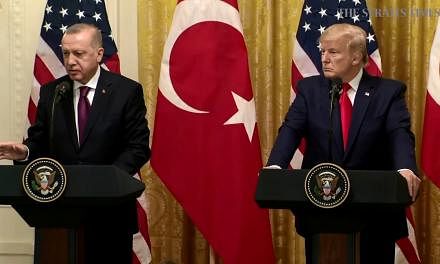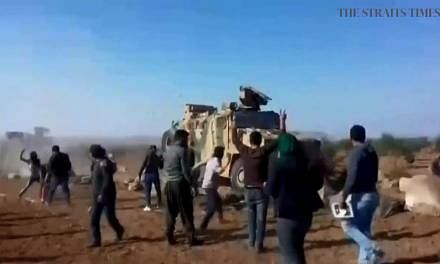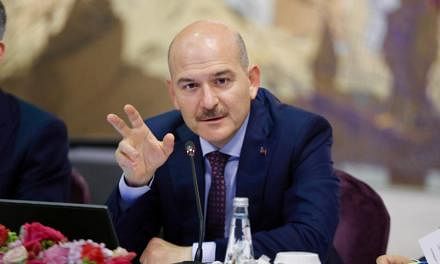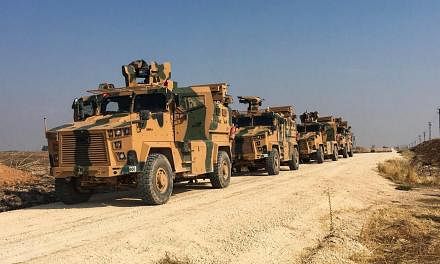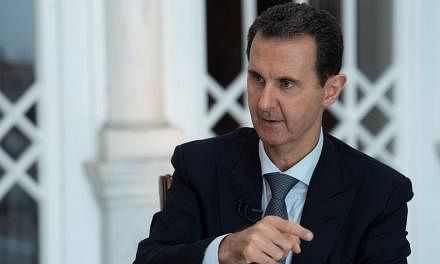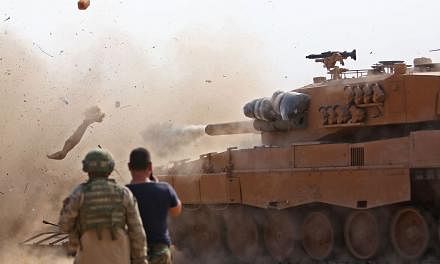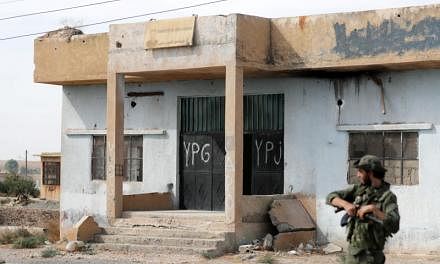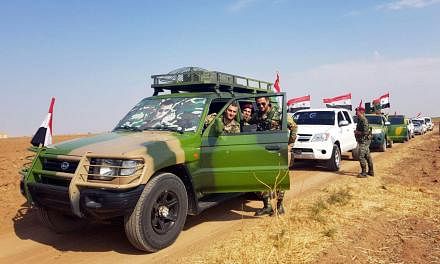WASHINGTON (WASHINGTON POST) - In President Donald Trump's telling on Wednesday (Oct 23), his withdrawal of all but a few US forces from Syria makes good on his promise to shake off the sand of faraway Middle East conflicts and to let other countries play policeman for a change.
Mr Trump hopes his decision will please his most loyal political supporters, who tend to love it when he pokes a finger in the eye of the naysayers. Thus, Mr Trump proudly owned what his critics see as a debacle born of wilful ignorance.
"Let someone else fight over this long-bloodstained sand," Mr Trump said at the White House.
He declared a "major breakthrough" as a United States-backed ceasefire along the Syrian-Turkish border largely held, and claimed that he is saving American and Kurdish lives while pulling the plug on indefinite US military commitments.
Even close political allies of Mr Trump's have called it a blunder to abandon Syrian Kurdish allies and open the door to Russian and Turkish control of a strategic crossroads between the Middle East and Europe.
But Mr Trump has taken to wearing their scorn as a badge of honour - evidence not that he has made a foolish decision but that he is breaking with foreign policy conventions he has derided as costing too much treasure and lives in pursuit of high-minded internationalist ideals anathema to his nationalist world view.
"As a candidate for president, I made clear that we needed a new approach to American foreign policy, one guided not by ideology, but by experience, history, and a realistic understanding of the world," he said from a lectern in the White House's Diplomatic Reception Room.
He claimed that his bold action in yanking forces had been a much-needed change. The ceasefire and longer-term security along the border would not have happened without the brief fighting that followed the US exit and Turkish invasion, he said.
"This was an outcome created by us, the United States, and nobody else, no other nation. Very simple. And we're willing to take blame, and we're also willing to take credit," Mr Trump said.
Mr Trump is banking on getting the credit come election time, at least from the ardent supporters he is hoping to turn out in droves for his re-election effort. His call to withdraw troops has become an applause line at his recent rallies.
"American combat troops should not be at the centre of ancient sectarian conflicts all over the world. Bring our soldiers back home," he said in Dallas last week to crowd chants of "Bring them back, bring them back, bring them back".
Foreign policy experts along with many lawmakers in both parties continue to warn that Mr Trump has made a foolhardy decision, and if the situation in Syria quickly deteriorates, Mr Trump will own it ahead of the election.
"The President might have a case that this is a rather minor tactical decision on the ground in a small part of the world that doesn't have a core American interest, but he's wrong in the assessment that it doesn't have broader implications," said Mr Douglas Lute, a former US ambassador to Nato.
"That may play well to the President's base, but it doesn't play well to anybody who understands America's role more broadly in the world, which has been founded for 70 years on American credibility."
Mr Trump did not mention the deal between Turkey and Russia reached on Tuesday that pushes Syrian Kurdish fighters from a wide belt of Syrian territory just south of Turkey's border and seals the Russian dominance in Syria as the US steps aside.
He did not mention Russia by name at all.
"Other countries have stepped forward; they want to help, and we think that's great," Mr Trump said.
"The nations in the region must ultimately take on the responsibility of helping Turkey and Syria police their border. We want other nations to get involved."
A senior administration official, who spoke on the condition of anonymity to expand on the President's remarks in a call with reporters later on Wednesday, was asked whether the White House is concerned about Russia's newly expanded role.
"I think we always watch the Russians warily, wherever they are," the official said. "And so, the deal between Turkey and the Russians is something that's between them. We did not have any role to play in that."
That's just the problem, Senator Marco Rubio, a Florida Republican, suggested in a tweet on Wednesday.
"Erdogan has NOT agreed to stop all military operations in #Syria," he wrote, referring to Turkish President Recep Tayyip Erdogan, whom Mr Trump has invited to visit the White House next month.
"#Russia is going to: -Remove Kurdish forces from east & west of current Turk controlled areas, including Kurdish cities -Help #Turkey push all SDF forces 30km south from entire border -Take control of 5 oil fields."
Mr Trump said a small number of US forces will stay behind in northern Syria to guard oil infrastructure.
The administration official who spoke to reporters would not provide additional details about the number or location of those forces. Some troops are also temporarily being stationed in Iraq.
While Mr Trump claims those troops will come home soon, his administration will face a dilemma if tensions in Syria rise: Keep those troops there to help stabilise the region or send them home anyway to fulfil the President's promise?
Senator Lindsey Graham, a South Carolina Republican, opposed the withdrawal but gave cautious backing for the "safe zone" Mr Trump says is being created along the border.
He made clear he still thinks there is a risk of resurgent Islamic State in Iraq and Syria (ISIS) terrorism that only a US presence can reliably counter.
"I do not trust or believe that Turkey, Russia, or (Syrian President Bashar) Assad have the capability or the desire to protect America from radical Islamic threats like ISIS," Mr Graham said in a statement on Wednesday.
"While I agree that America is not the policeman of the world, I firmly believe the American military is the most capable to protect America and should be used wisely to do so," he said.
Mr Trump is selling voters a different message.
"How many Americans must die in the Middle East in the midst of these ancient sectarian and tribal conflicts?" he asked rhetorically as he announced the lifting of punitive sanctions meant to deter Turkey.
"After all of the precious blood and treasure America has poured into the deserts of the Middle East, I am committed to pursuing a different course - one that leads to victory for America."
The language echoed the nativist isolationism that shocked his political opponents as Mr Trump outmanoeuvred them during the 2016 election and that he plans to employ during his 2020 campaign.
"Turkey, Syria, and all forms of the Kurds, have been fighting for centuries," he said, implying that that was really none of America's concern.
"We have done them a great service, and we've done a great job for all of them. And now we're getting out."

